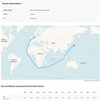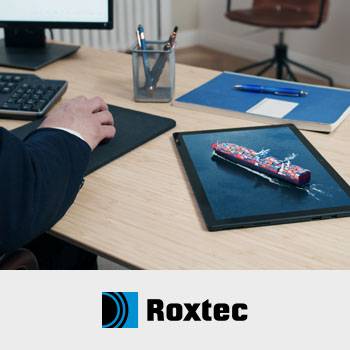This is a year to get things done in Washington. After a relatively unproductive congressional session last year and a slow start to the 106th Congress due to the focus on impeachment, the congressional leadership is promising an active year focused on "the people's business." That activism is good news for America's tugboat, towboat and barge industry, as there are two items - the deficit reduction tax and the use of strict criminal liability statutes - that ought to be addressed by this Congress.
First, while the budget surplus debate considers options ranging from saving social security to paying down the national debt, we're told that public opinion polls do not generally favor spending the surplus in the form of a tax cut. However, when it comes to relief from the 4.3 cent per gallon deficit reduction tax imposed on transportation fuel, I know any poll of our industry would tell a different story; especially given the fanfare surrounding the achievement of the first balanced federal budget in a generation. This deficit reduction tax, which is paid by both the inland waterways transportation industry and our colleagues in the railroad industry, should be repealed.
This tax, first enacted as part of the Omnibus Reconciliation Act of 1993, was specifically designed to reduce the federal deficit. Today, it imposes a burden of more than $20 million annually directly on the industry's bottom line. That's especially egregious at a time of federal budget surpluses.
Last year, as part of the reauthorization of the Intermodal Transportation Efficiency Act, also known as ISTEA, the trucking industry was successful in transferring its 4.3 cent deficit reduction tax to the Highway Trust Fund. To further increase the chance that those tax revenues will be used for the direct benefit of highway users, Rep. Bud Shuster (R-Pa.), Chairman of the House Transportation and Infrastructure Committee, moved the Highway Trust Fund off-budget to avoid mandated spending caps and to streamline the allocations process. A similar treatment for the Inland Waterways Trust Fund, while preferable to augmenting the general treasury, is unnecessary and would only add to the Trust Fund's already generous $340 million balance. Moreover, fuel taxes paid by the industry each year currently generate over $100 million for the Inland Waterways Trust Fund, ensuring sufficient fund balances for a generation to match federal expenditures for lock and dam modernization and rehabilitation.
Already this year, Rep. Kenny Hulshof (R-Mo.) and 22 other members of the House of Representatives introduced H.R. 1001, the Transportation Tax Equity and Fairness Act, calling for repeal of the 4.3 cent deficit reduction tax for both the inland waterways industry and the railroads. Both on its face and upon closer scrutiny, the logic of the deficit reduction tax is now evasive and with proper legislative positioning and time, this bill calling for its elimination should draw support.
There is another wrong that should be made right by the 106th Congress and that involves the increasing use of strict criminal liability statutes to prosecute oil spills.
From the tragedy of Exxon Valdez, Congress responded with the Oil Pollution Act of 1990, or OPA 90. And by most meaningful measures, this legislation has been successful. The number of oil spills has effectively diminished and the cooperative public/private response partnership envisioned in 1990 is in place today. However, the recent and real threat of criminal action against careful, responsible operators threatens to erode the progress that has been made.
AWO and other maritime interests are concerned by the Justice Department's increasing tendency to use century-old strict criminal liability statues, such as the 1918 Migratory Bird Treaty Act and the 1899 Refuse Act, as a basis for criminal prosecution of oil spill incidents. This tact enables the government to impose criminal sanctions without requiring a demonstration of criminal knowledge, intent or even negligence. Needless to say, these federal actions have created an atmosphere of extreme uncertainty for anyone engaged in the business of moving petroleum.
These independent strict liability statues are unrelated to the regulation and enforcement of oil transportation activities. In the case of the Migratory Bird Treaty Act, the law was originally enacted as a "hunting statute" to keep people from killing or capturing migratory birds. The act was not included within the comprehensive OPA 90 legislation. That is because OPA 90 does have criminal sanctions that properly follow the traditional notion of what constitutes a criminal act in this country - namely, that a crime occurs when a knowing, intentional act is committed or when a party's conduct is so egregious that "negligence" has occurred.
This unjustified use of strict liability statutes is undermining OPA 90's primary objectives of preventing and responding appropriately to oil spills. All responsible companies want to address the foreseeable risks associated with their business. But the presence of strict liability criminal laws means no company engaged in the transport of oil can mitigate the risk of prosecution. No matter how well maintained the equipment or how advanced the crew training, if oil goes into the water by an act of God, the vessel operators and company representatives can go to jail. This is obviously a huge disincentive, both to experienced mariners and to new people entering the petroleum transportation business -- an industry sector that needs good people. In short, the only way to eliminate the risk of criminal prosecution under the current situation is to get out of the business of moving petroleum.
This unfair predicament can be resolved by enacting legislation that reasserts the preeminent role of OPA 90 as the statute providing the exclusive criminal penalties for oil spills. Such legislation will ensure the increased cooperation and responsiveness desired by everyone interested in oil spill response issues, while not diluting the deterrent effect of stringent criminal penalties imposed by OPA 90 itself. Operators who create or allow situations that lead to oil spills should be held completely accountable for their actions. However, companies that have done everything right yet still face the misfortune of an oil spill should not be additionally threatened with strict criminal liability. Correcting this situation will restore the spirit of OPA 90 and allow its positive results to endure and improve. Senator John Breaux (D-La.) has shown leadership in moving this issue forward, and we are hopeful that other members of Congress will join him in strengthening OPA 90 by making it the exclusive federal statute for criminal penalties for oil pollution.
The anticipation that Congress might awaken from its preoccupation of recent months with an invigorated sense of activism and urgency to achieve real results for American citizens, gives us reason to believe that correcting these two inequities is possible in the near term. That would certainly benefit our industry and our customers, allowing us both to enter the next century even stronger than we are today.
Thomas Allegretti is president of the American Waterways Operators.
This is a year to get things done in Washington. After a relatively unproductive congressional session last year and a slow start to the 106th Congress due to the focus on impeachment, the congressional leadership is promising an active year focused on "the people's business." That activism is good news for America's tugboat, towboat and barge industry, as there are two items - the deficit reduction tax and the use of strict criminal liability statutes - that ought to be addressed by this Congress.
First, while the budget surplus debate considers options ranging from saving social security to paying down the national debt, we're told that public opinion polls do not generally favor spending the surplus in the form of a tax cut. However, when it comes to relief from the 4.3 cent per gallon deficit reduction tax imposed on transportation fuel, I know any poll of our industry would tell a different story; especially given the fanfare surrounding the achievement of the first balanced federal budget in a generation. This deficit reduction tax, which is paid by both the inland waterways transportation industry and our colleagues in the railroad industry, should be repealed.
This tax, first enacted as part of the Omnibus Reconciliation Act of 1993, was specifically designed to reduce the federal deficit. Today, it imposes a burden of more than $20 million annually directly on the industry's bottom line. That's especially egregious at a time of federal budget surpluses.
Last year, as part of the reauthorization of the Intermodal Transportation Efficiency Act, also known as ISTEA, the trucking industry was successful in transferring its 4.3 cent deficit reduction tax to the Highway Trust Fund. To further increase the chance that those tax revenues will be used for the direct benefit of highway users, Rep. Bud Shuster (R-Pa.), Chairman of the House Transportation and Infrastructure Committee, moved the Highway Trust Fund off-budget to avoid mandated spending caps and to streamline the allocations process. A similar treatment for the Inland Waterways Trust Fund, while preferable to augmenting the general treasury, is unnecessary and would only add to the Trust Fund's already generous $340 million balance. Moreover, fuel taxes paid by the industry each year currently generate over $100 million for the Inland Waterways Trust Fund, ensuring sufficient fund balances for a generation to match federal expenditures for lock and dam modernization and rehabilitation.
Already this year, Rep. Kenny Hulshof (R-Mo.) and 22 other members of the House of Representatives introduced H.R. 1001, the Transportation Tax Equity and Fairness Act, calling for repeal of the 4.3 cent deficit reduction tax for both the inland waterways industry and the railroads. Both on its face and upon closer scrutiny, the logic of the deficit reduction tax is now evasive and with proper legislative positioning and time, this bill calling for its elimination should draw support.
There is another wrong that should be made right by the 106th Congress and that involves the increasing use of strict criminal liability statutes to prosecute oil spills.
From the tragedy of Exxon Valdez, Congress responded with the Oil Pollution Act of 1990, or OPA 90. And by most meaningful measures, this legislation has been successful. The number of oil spills has effectively diminished and the cooperative public/private response partnership envisioned in 1990 is in place today. However, the recent and real threat of criminal action against careful, responsible operators threatens to erode the progress that has been made.
AWO and other maritime interests are concerned by the Justice Department's increasing tendency to use century-old strict criminal liability statues, such as the 1918 Migratory Bird Treaty Act and the 1899 Refuse Act, as a basis for criminal prosecution of oil spill incidents. This tact enables the government to impose criminal sanctions without requiring a demonstration of criminal knowledge, intent or even negligence. Needless to say, these federal actions have created an atmosphere of extreme uncertainty for anyone engaged in the business of moving petroleum.
These independent strict liability statues are unrelated to the regulation and enforcement of oil transportation activities. In the case of the Migratory Bird Treaty Act, the law was originally enacted as a "hunting statute" to keep people from killing or capturing migratory birds. The act was not included within the comprehensive OPA 90 legislation. That is because OPA 90 does have criminal sanctions that properly follow the traditional notion of what constitutes a criminal act in this country - namely, that a crime occurs when a knowing, intentional act is committed or when a party's conduct is so egregious that "negligence" has occurred.
This unjustified use of strict liability statutes is undermining OPA 90's primary objectives of preventing and responding appropriately to oil spills. All responsible companies want to address the foreseeable risks associated with their business. But the presence of strict liability criminal laws means no company engaged in the transport of oil can mitigate the risk of prosecution. No matter how well maintained the equipment or how advanced the crew training, if oil goes into the water by an act of God, the vessel operators and company representatives can go to jail. This is obviously a huge disincentive, both to experienced mariners and to new people entering the petroleum transportation business -- an industry sector that needs good people. In short, the only way to eliminate the risk of criminal prosecution under the current situation is to get out of the business of moving petroleum.
This unfair predicament can be resolved by enacting legislation that reasserts the preeminent role of OPA 90 as the statute providing the exclusive criminal penalties for oil spills. Such legislation will ensure the increased cooperation and responsiveness desired by everyone interested in oil spill response issues, while not diluting the deterrent effect of stringent criminal penalties imposed by OPA 90 itself. Operators who create or allow situations that lead to oil spills should be held completely accountable for their actions. However, companies that have done everything right yet still face the misfortune of an oil spill should not be additionally threatened with strict criminal liability. Correcting this situation will restore the spirit of OPA 90 and allow its positive results to endure and improve. Senator John Breaux (D-La.) has shown leadership in moving this issue forward, and we are hopeful that other members of Congress will join him in strengthening OPA 90 by making it the exclusive federal statute for criminal penalties for oil pollution.
The anticipation that Congress might awaken from its preoccupation of recent months with an invigorated sense of activism and urgency to achieve real results for American citizens, gives us reason to believe that correcting these two inequities is possible in the near term. That would certainly benefit our industry and our customers, allowing us both to enter the next century even stronger than we are today.
Thomas Allegretti is president of the American Waterways Operators.
Sponsored Content
LR - Fit for 55: Managing compliance and optimising operations

Use Roxtec seals, services and software

Subscribe for
Maritime Reporter E-News
Maritime Reporter E-News is the maritime industry's largest circulation and most authoritative ENews Service, delivered to your Email five times per week









